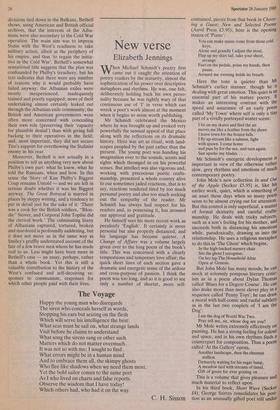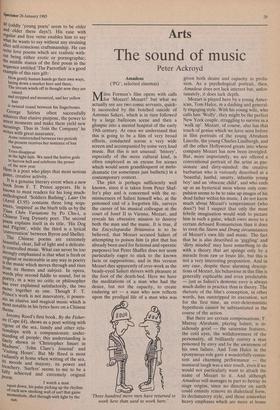New verse
Elizabeth Jennings
When Michael Schmidt's poetry first came out it caught the attention of poetry readers by the maturity, almost the sophistication of his power over descriptive metaphors and rhythms. Ije was, one felt, deliberately holding back his own perso- nality because he was rightly wary of that continuous use of 'I' in verse which can wreck a poet's work almost at the moment when it begins to seem worth publishing. Mr Schmidt celebrated the Mexico where he was brought up and evoked very powerfully the sensual appeal of that place along with the reflections on its dramatic history. Here was art as ritual, with land- scapes peopled by the past rather than the present. The young poet was handing his imagination over to the sounds, scents and sights which thronged in on his powerful senses. But intellect was also vigorous and, working with precocious poetic crafts- manship, presented a whole country alive to our sometimes jaded reactions, that is to say, reactions rendered tired by too much personal poetry and also too much seeking out the sympathy of the reader. Mr Schmidt has always had respect for his readers and, in possessing it, has aroused our approval and gratitude. He himself sees his more recent work as peculiarly 'English'. It certainly is more personal but also properly distanced; and his language has become quieter. A Change of Affairs was a volume largely given over to the long poem of the book's title. This was concerned with a clearly tempestuous and temporary love affair; the quick short lines of each section gave a dramatic and energetic sense of the ardour and cross-purpose of passion. I think the poem was too long, and so it is good to see only a number of shorter, more self- contained, pieces from that book in Choos- ing a Guest:. New and Selected Poems (Anvil Press £3.95); here is the opening stanza of 'Piano':
You can make music come from those cold keys.
Alone and grandly I adjust the stool, Flap up my shirt tail, take your sheet, arrange Feet on the pedals, poise my hands, then pause.
Around me evening holds its breath.
Here the tone is quieter than Mr Schmidt's earlier manner, though he Is dealing with great emotion. This quiet is an essential part of his mature poetry. It makes an interesting contrast with the speed and assurance of an early poem called 'My Town' where self is only a tiny part of a vividly portrayed winter scene: I tie on my skates and find the air
moves me like a feather from the shore.
I leave town for the frozen falls.
I fly up-stream like a salmon, light with spawn. I come home and pass by for the sea, and turn again.
Sun sparks my blades . . .
Mr Schmidt's energetic development is important in view of the otherwise rather slow, grey rhythms and emotions of much contemporary poetry. John Mole's new collection In and Out of the Apple (Secker £5.95) is, like his earlier work, quiet, which is something of an asset these days when so many poets seem to be almost crying out for attention. But this control is only superficial, a matter of formal dexterity and careful crafts- manship. He deals with tricky subjects, such as a son's feeling for his mother, and succeeds both in distancing his emotions while, paradoxically, drawing us into the relationship. He uses a religious metaphor to do this in 'The Ghost' which begins, In the high-backed nursery chair
Sits the ghost I recognise; On her lap The Household Altar Open at Genesis.
But John Mole has many moods; he can mock at solemnly pompous literary critic- ism as in a poem about Dylan Thomas called 'Blues for a Degree Course'. He can also make more than mere clever play in a sequence called 'Penny Toys'; he can drag/ a moral with half-comic and rueful subtlety as in the last two couplets of 'I am the Dog': I am the dog of World War Two.
Pray tell me, sir, whose dog are you?
Mr Mole writes extremely effectively on painting. He has a strong feeling for colour and space, and in his own rhythms finds a counterpart for composition. Thus a poem called 'At the Gallery' opens,
Another landscape, then the chestnut stallion Demurely waiting for his sugar-lump, A meadow tied with streams of tinsel, Gift of green for ever grazing on . .
This is a volume that gives pleasure and much material to reflect upon. In his third book, Short Wave (Seeker £4), George Szirtes consolidates his posi- tion as an unusually gifted poet still under 40 (oddly 'young poets' seem to be older and older these days!). His ease with regular and free verse enables him to say what he wants to say without any straining after self-conscious craftsmanship. He can write love poems which are realistic with- out being either erotic or pornographic; the middle stanza of the first poem in the sequence entitled 'The Parrotfish' is a good example of this rare gift:
How gently human hands go their own ways, laying down a marker here and there, The stream winds off in thought now they are raised and stripped and mounted, and her yellow hair is twisted round between his fingerbones.
George Szirtes often successfully achieves that elusive purpose, the power to arrest moments and make them yield new meanings. Thus in 'Join the Company' he writes with great assurance,
Arms outstretched between two periods the present receives her sentence of lost hours.
Trees disappear as the light fails. We need the festive gods to harrow hell and celebrate the power of the new year
Here is a poet who plays that most serious game, creative activity.
It is a genuine literary event when a new book from F. T. Prince appears. He is known to most readers for his long much- anthologised 'Soldiers Bathing'; Later On (Anvil £3.95) contains three long sequ- ences, 'inspired' as the blurb tells us by the Yrian Chen Variations by Po Chu-i, a Chinese Tang Dynasty poet. The second Poem explains itself in its title, 'His Dog and Pilgrim',while the third is a lyrical conversation' between Byron and Shelley. The Chinese poems are extremely beautiful, clear, full of light and a delicate- ly controlled music. What can never be too strongly emphasised is that what is fresh or 0 nginal or memorable in any way in poetry IS the music which moves through and rises from its themes and subject. In opera, Words play second fiddle to sound, but in Poetry, in a way no critic or philosopher has ever explained satisfactorily, the two move together as one. Though F. T. Prince's work is not innovatory, it posses- ses an elusive and magical music which is most notable in his lyrics here on a Chinese theme.
. Jeremy Reed's first book, By the Fisher- ies (Cape £4), shows us a poet writing with vigour of the sea, family and other rela- tionships with a compassionate under- standing of people; this understanding is finely shown in 'Christopher Smart in Madness', 'John Clare's Journal' and Visiting Hours'. But Mr Reed is most radiantly at home when writing of the sea, its moods and majesty, its power and treachery. 'Surfers' seems to me to be a
fully achieved and extremely original Poem.
I watch a man squat down, his pulse picking up the rhythm of each new smoking wall of surf that gains momentum, shot through with light by the sun.











































 Previous page
Previous page